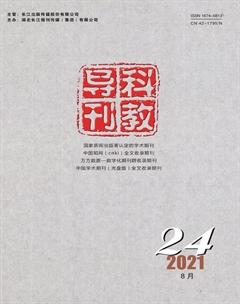基于学科特点进行教学
喻伯军
我曾经在许多时候问过学生和老师:科学课最大的特点是什么?几乎所有的学生和老师都认为,实验是科学课的重要特点,是区别于其他学科的标志。
我们一般所说的实验,并不是科学上的真正“实验”,其实包含了学生在学习过程中的观察、实验、测量、制作等活动,即包含了科学探究与工程实践的活动。探究实践活动,为什么会受到师生如此重视呢?
一是探究实践活动深受学生欢迎,可以激发学生的学习兴趣。学生亲自参与探究实践,不仅能更好地开展科学学习,掌握所学的概念,提升动手能力和问题解决能力,更能激发学习兴趣和创新意识,获得成功和成就感。
二是科学课程的学习内容,适合采用探究实践的方式进行学习,如果采用讲授式教学,许多内容学生很难学会。研究表明,场依存类型的学生,在学习理科时,必须依靠一定的情境或者动手的经历,才能有效地理解一些抽象的科学概念。因此,在课堂教学中运用以探究实践为主的学习方式,对一些重要概念的理解和掌握尤为重要。小学科学作为实践性的学科,必须注重学生的亲自动手、亲身体验,通过探究实践获得经验,建构概念。
三是培养实践能力和创新精神的重要途径。学生的创造力发挥、创新精神的培养,有效路径之一就是在问题情境中完成任务。大量研究表明,在科学教学中,学生更容易在动手动脑制作中发挥创造力。如一些细小问题的解决,能很好地激发学生的创造性,解决了问题之后,他们又能获得成功的体验,从而产生强大的学习动力。因此,尽量让学生动手实践与动脑配合,是科学课成功的重要途径。
2017版小学科学课程标准中,对小学科学的性质做了界定:小学科学是一门实践性课程,也是一门综合性课程。课程标准对小学科学的学科特点的归纳,道出了小学科学学科有别于其他学科的教学特点。基于科学课程的特点,教师如何在日常教学中实施好教学呢?
首先,教师必须建立一种意识——科学课必须进行学生亲自参与的探究实践活动,这也是科学课的底线,是不允许突破的。作为专职科学教师,就要尽量开展分组实验教学,可以偶尔穿插演示实验;作为兼职科学教师,要尽量做演示实验,偶尔也要开展分组实验活动。注重探究实践的课程,必须有充足的器材做保证,教学器材是实施好科学课程的重要基础,教学器材的配置,是行政部门和学校的责任。我们可以给仪器装备部门提出建议,不断改进仪器配备的种类、数量和质量,保证器材的供应。一些地方已经探索了耗材配送的措施,保证了所有学校的教学需要。只有这样,才能保证实验教学落到实处。
其次,教师要亲自动手开展下水实验,这是保证教师上好课的关键。现行教材中的不少探究实践活动,许多科学教师没有亲自做过,对此缺乏感受,上课时就会出现一些意想不到的情况,导致实验失败、器材浪费,影响教学。因此,科学教师在备课的时候,一定要亲自做下水实验,这样有助于把握实验的重点内容,有助于开展课堂教学,更有助于提高教学的效率。同时,教师也应该适当地开展自制教具,根据实际情况加以补充。
最后,要保证充足的时间和空间,让学生动手实践。实践表明,一般情况下,40分钟的一节课中,能够让学生动手实践的时间达到20分钟左右,是属于比较理想的了。这就要求教师改变以讲解知识为主的教学方法,尽量准备充足的器材、設计驱动性的问题和任务,让学生在完成一个个任务的过程中,学习科学知识、迁移应用、解决实际问题,以科学课程的特点进行教学,实现良好的教学效果。
Teaching Based on Subject Characteristics
YU Bojun
中图分类号:G424文献标识码:ADOI:10.16400/j.cnki.kjdk.2021.24.001
YU Bojun
Deputy Director of Zhejiang Provincial Teaching and Research Office
Primary School Science Teacher
Core Member of Science Curriculum Standard Revision Group of Ministry of Education
Theauthorhasaskedstudentsandteachers many times: what is the biggest feature of science class? Almost all students and teachers believe that experiment is an important feature of science class and a symbol different from other disciplines.
The experiment we generally call is not a real"experiment" in science. In fact, it includes students’ observation, experiment, measurement, production and other activities in the learning process, that is, it in? cludes the activities of scientific exploration and engi? neering practice. Why do teachers and students at? tach so much importance to inquiry practice?
First, inquiry practice activities are welcomed by students and can stimulate students’ interest in learn? ing. Students’ personal participation in inquiry prac? tice can not only better carry out scientific learning, master the concepts learned, improve their hands-on ability and problem-solving ability, but also stimulate their learning interest and innovative consciousness, and obtain a sense of success and achievement.
Second, the learning content of science curricu? lum is suitable for learning by means of inquiry and practice. If teaching is adopted, many contents are difficult for students to learn. Research shows that field dependent students must rely on certain situa? tions or hands-on experience in learning science in order to effectively understand some abstract scientif? ic concepts. Therefore, it is particularly important to understand and master some important concepts by using the learning method based on inquiry and prac? tice in classroom teaching. As a practical subject, pri? mary school science must pay attention to students’ hands-on and personal experience, obtain experience through exploration and practice, and construct con? cepts.
Third, it is an important way to cultivate practi? cal ability and innovative spirit. One of the effective ways to give full play to students’ creativity and cul? tivate their innovative spirit is to complete tasks in problem situations. A large number of studies show that in science teaching, students are more likely to give play to their creativity in hands-on and brain production. For example, the solution of some small problems can well stimulate students’ creativity. After solving the problems, they can get a successful expe? rience, so as to generate strong learning motivation.Therefore, it is an important way to make students practice and use their brains as much as possible.
The 2017 edition of primary school science cur? riculum standard defines the nature of primary school science: primary school science is not only a practi? cal course, but also a comprehensive course. The cur? riculum standard summarizes the discipline character? isticsofprimaryschoolscience,whichshowsthe teaching characteristics of primary school science dif? ferent from other disciplines. Based on the character? istics of science curriculum, how can teachers imple? ment teaching well in daily teaching?
First of all, teachers must establish a sense that science class must carry out inquiry and practice ac? tivitiesinwhichstudentspersonallyparticipate, which is also the bottom line of science class and is not allowed to break through. As a full-time science teacher, we should try our best to carry out group ex? periment teaching, and demonstration experiments can be interspersed occasionally; As a part-time science teacher, we should try our best to do demonstration experiments and occasionally carry out group experi? ment activities. The curriculum focusing on inquiry and practice must be guaranteed by sufficient equip? ment. Teaching equipment is an important basis for the implementation of science curriculum. The alloca? tion of teaching equipment is the responsibility of ad? ministrative departments and schools. We can put for? ward suggestions to the instrument and equipment de? partment, constantly improve the type, quantity and qualityofinstruments,andensurethesupplyof equipment. Some places have explored the measures ofconsumablesdistributiontoensuretheteaching needs of all schools. Only in this way can we ensure the implementation of experimental teaching.
Secondly,teachersshouldpersonallycarryout launching experiments, which is the key to ensure that teachers have a good class. Many science teach? ers have not done many inquiry practice activities in the current teaching materials, and they lack feelings about them. There will be some unexpected situations in class, resulting in experimental failure, waste of equipmentandaffectingteaching.Therefore,when preparinglessons,scienceteachersmustpersonally dothelaunchingexperiment,whichwillhelpto grasp the key contents of the experiment, carry out classroomteachingandimprovetheefficiencyof teaching. At the same time, teachers should also ap? propriately carry out self-made teaching aids and sup? plement them according to the actual situation.
Finally,weshouldensuresufficienttimeand space for students to practice. Practice shows that generally, in a 40 minute class, it is ideal to allow students to practice for about 20 minutes. This re? quires teachers to change the teaching method focus? ing on explaining knowledge, prepare sufficient equip? ment and design driven problems and tasks as far as possible, so that students can learn scientific knowl? edge, transfer applications, solve practical problems, teach with the characteristics of science courses and achieve good teaching results in the process of com? pleting tasks.

